The Power of the Dog
 for brief sexual content/full nudity.
for brief sexual content/full nudity.
Reviewed by: Jim O'Neill
CONTRIBUTOR
| Moral Rating: | Very Offensive |
| Moviemaking Quality: |
|
| Primary Audience: | Adults |
| Genre: | Western Romance Drama |
| Length: | 2 hr. 6 min. |
| Year of Release: | 2021 |
| USA Release: |
September 4, 2021 (festival) December 1, 2021 (Netflix) |
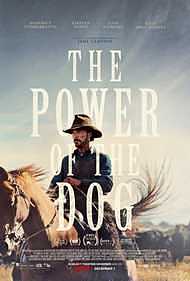

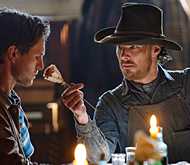
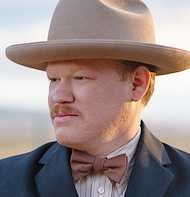
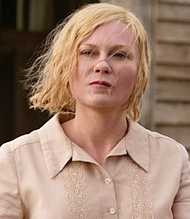
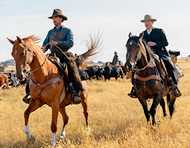
Revisionist Westerns
Films that are sad, disturbing, depressing, and without hope — all darkness and no light
Modern political correctness in movies
Montana in the 1920s
The novel on which this film is based was authored by Thomas Savage (1915–2003), a man with various semi-secret homosexual relationships.
Wealthy ranch owner brothers with strained relationship — one who is simple and honest and the other cold and malicious
Homosexual desires / partially repressed homosexuality
Homosexual man who always tries to be the alpha male (“over-compensating”)
Sexual perversion
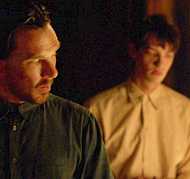
Older men seducing younger men and boys
GAY—What’s wrong with being Gay? Answer —Homosexual behavior versus the Bible: Are people born Gay? Does homosexuality harm anyone? Is it anyone’s business? Are homosexual and heterosexual relationships equally valid?
What about Gays needs to change? Answer —It may not be what you think.
Read stories about those who have struggled with homosexuality

PORN—How can I tell if I’m getting addicted to pornography or sex? Answer
Man with rough ways who revels in taunting and belittling others
Widow and her teenage son
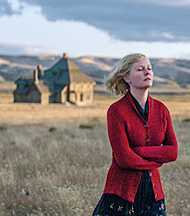
Public humiliation
Becoming a drunk alcoholic
Jealousy
Animal cruelty / sadism
Murder / secretly causing the intentional death of one’s enemy
| Featuring |
|---|
|
Benedict Cumberbatch … Phil Burbank Geneviève Lemon (Genevieve Lemon) … Mrs Lewis Jesse Plemons … George Burbank Kodi Smit-McPhee … Peter Gordon Kirsten Dunst … Rose Gordon Keith Carradine … The Governor George Mason … Cricket See all » |
| Director |
|
Jane Campion |
| Producer |
|
See-Saw Films [Great Britain] Brightstar [Great Britain] See all » |
| Distributor |
“Deliver me from the sword, my precious life from the power of the dog… dominion belongs to the Lord, and he rules over the nations.” —Psalm 22 excerpt
Jane Campion takes the words from David’s psalm as the title for her new, and widely praised, film, “The Power of the Dog.” The 22nd Psalm begins with a cry of separation and loss: “My God, My God, why have you forsaken me?” Even “roaring prayers” are not reaching their target. Yet the psalmist ends on a note of joy. His emotional outcry is tempered by the calming truth that he lives in the Lord’s presence, a Lord who will “make known His faithfulness to a people yet to be born.”
Campion’s adaptation of the 1967 novel by Thomas Savage is, like the psalm, an emotional outcry, but one without a resolution, certainly not one rooted in truth or in hope. Instead, she tells a story of arrested emotional development, a condition that has deadly consequences, not just for one of the story’s characters, but for a culture that she apparently disdains. Her film is an anti-Western, an updated but perverse re-imagining of the genre, one that rejects and subverts the classic frontier virtues of endurance and hope.
Campion has made an expressionistic, almost somnambulistic, work that distorts reality in order to express the artist’s own emotional state and her cryptic worldview. She puts forth every stereotype imposed upon today’s culture and especially upon today’s cinema: toxic masculinity, oppressed femininity, impotent chivalry, and homosexual victimhood.
She does cleverly interchange those roles so that viewers’ assumptions are twisted in surprising and disturbing ways. In the end, it remains unclear exactly who are the oppressors and who are the victims. Getting that imbalance right is a tough balancing act, and for the most part Campion pulls it off. It’s when she casts her nets into deeper waters that she comes up empty.
Her able cast perform their parts, mostly types, well enough, but there is too much reliance on suggestive glances, curt asides and gaping pauses to allow the actors to develop anything resembling flesh and blood personas. Ultimately, most of the performances (with the exception of Benedict Cumberbatch occasionally and young Kodi Smit-McPhee as a delicate flower, albeit one of the Deadly Nightshade variety) come off as dry as the wilderness underbrush.
Phil Burbank (Cumberbatch) is a rancher in 1925 Montana. He shares his ranch, and strangely his bed, with his brother, George (Jesse Plemons). Phil is able and strong, but he is also mean. He calls his brother “Fatso,” and when gentlemanly George marries innkeeper Rose (Kirsten Dunst), Phil turns his venom on her, so much so that she seeks solace in alcohol and, more dangerously, in the arms of her son, the effeminate but oddly fearless Peter (Smit-McPhee).
The tall, spindly and, on the surface, withdrawn teenager makes paper flower cut-outs, plays with a hula hoop (visionary, or maybe just kooky, in 1925 Montana), and prances among raucous ranchers while wearing a cowboy hat several sizes too big for his head. Phil, of course, has a field day with Peter’s quirks.
Phil (Benedict Cumberbatch) is more comfortable in his stable than in his estate living room. He warns others to stay away from him because “I’ve been around horses all day,” or more succinctly by saying “I stink.” His only emotional connection seems to be with a rancher and mentor who died earlier, a mythic figure with the too-mythic name of Bronco Henry. There is something of the unresolved in that relationship; something more than just hinted at.
In case the viewer doesn’t get the point, Campion makes sure that the “love that dare not speak its name” keeps rearing its head.
Q & A
GAY—What’s wrong with being Gay? Answer —Homosexual behavior versus the Bible: Are people born Gay? Does homosexuality harm anyone? Is it anyone’s business? Are homosexual and heterosexual relationships equally valid?
Read stories about those who have struggled with homosexuality
What about Gays needs to change? Answer —It may not be what you think.
At one point, Phil takes an interest in Peter, mentoring him in the ways of knot tying and horse riding. Their developing closeness has hints of pining but also of danger. As Phil starts to soften, Peter responds in more aggressive and disturbing ways. I don’t want to give too much away; let’s just say Peter does not handle bunny rabbits with the same delicacy he does paper flowers.
As she did in 1993’s “The Piano,” Campion reduces humanity to its carnal elements. Desire, whether fulfilled or longed-for, is the driving force behind most of her dramas. The lack of a spiritual core, or even a moral one, gives her newest film a shaky foundation. Its pulse may race at certain moments, but it too often weakens to the point of being barely audible.
The movie’s ending is a shocker, but it does not hurt the way it should. It needs to cry out for atonement and renewal, but sadly, or worse, it seems to justify the means to its end, and accepts, even condones, ancient condemnable sins if they are committed in the cause of stamping out modern cancelable ones.
Q & A
About the fall of mankind to worldwide depravity
What is SIN AND WICKEDNESS? Is it just “bad people” that are sinners, or are YOU a sinner? Answer
Campion’s film is set in Montana but was filmed in New Zealand. The landscape looks molten and amorphous; she goes more for a mild West than a wild one. There are no mountain peaks, no plains, and only two Indians who account for little more than scenery. It lacks a sense of locale, a major flaw for a Western, and can’t seem to find a starting point let alone a place to direct oneself toward, to explore, and to ultimately subdue and have dominion over.
The characters see their horizon not in terms of an outdoor adventure but as an inward journey, a kind of Rorschach test: “What do you see when you look at those hills?” one of the characters asks.
Campion seems to draw less from classic Hollywood Westerns than she does from deconstructed ones, the type Robert Altman (“McCabe and Mrs. Miller”), Paul Morrissey (“Lonesome Cowboys”), and Sam Peckinpah (“Pat Garrett and Billy the Kid”) used to make in the 1970s. Yet for all its bows to modern day sentiment it lacks the radicalism, and vibrant entropy, of those more daring ventures. If I wanted toxic masculinity, complete with comeuppance and restitution I would go to John Ford’s “The Searchers” or Howard Hawks’ “Red River.” Or even “Mad Max: Fury Road,” a modern re-working of the classic frontier adventure-drama.
Campion rejects the concept of frontier, especially its American incarnation. She strips it of grandeur and hope, and in doing so, loses her way.
There is abundant, and mostly awkward, male nudity. Campion may like to expose flesh, and wide expanses of untamed land, but she does not lay bare what is deep within the heart and how that heart reacts to suffering. The psalm from which the film takes its title reminds us that there is a Redeemer whose heart suffers as well, who binds his suffering to ours and asks that we do the same in return. In doing so, He ensures us a happy end. A realized frontier will some day be ours if we place our trust in Him.
Q & A
 Discover the good news that Jesus Christ offers
Discover the good news that Jesus Christ offers
 Why is the world the way it is? If God is all-knowing, all-powerful, and loving, would He really create a world like this? (filled with oppression, suffering, death and cruelty) Answer
Why is the world the way it is? If God is all-knowing, all-powerful, and loving, would He really create a world like this? (filled with oppression, suffering, death and cruelty) Answer
 Do you understand God’s Story? Take a short journey through the Bible, from Creation to eternity, summarizing of the Bible’s most important records, in chronological order.
Do you understand God’s Story? Take a short journey through the Bible, from Creation to eternity, summarizing of the Bible’s most important records, in chronological order.
Are you good enough to get to Heaven? Answer
The film’s end, a tragedy for one character and a pyrrhic victory for the others, leaves us with little hope. The finale defies charity and disdains faith. It is a serpent’s egg whose dangers may be evident from the start, but whose shell, when cracked, reveals a hollow core and a spent yoke.
- Nudity: Very Heavy to Extreme— • Men (full frontal and full rear) • Men with only their genitals covered • Barechested ranch hands
- Violence: Heavy
- Profane language: Heavy— • “For Christ’s sakes” (2) • “G*d damn” (2) • “My G*d” • “D*mn” (7) • “H*ll” (5), including “Holy H*ll”
- Vulgar/Crude language: Moderately Heavy— • “As soon as we could get h*rd-ons” • “Tomcatting” • “If it’s a piece of a** you’re after” • “You little b*tch” • “Son of a b*tch” • “F*ggot” • “Bugger” (a sodomite)
- Drugs/Alcohol: Heavy— • Excessive drinking • Smoking in several scenes
- Sex: Heavy— • Apparent scene of masturbation (not explicit) • Discussion about 2 men cuddling for warmth (possibly naked) • Suggestion that a man had a homosexual affair with an older ranch hand • Scenes with prostitutes and ranch hands • Sounds of couple having sex in a house
- Occult: Minor
See list of Relevant Issues—questions-and-answers.



